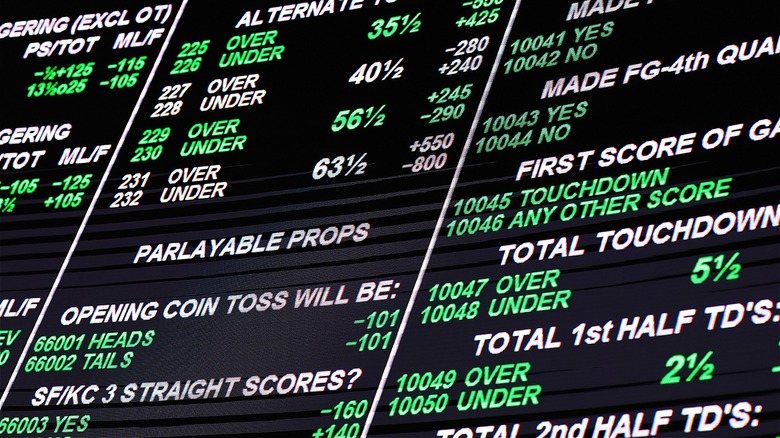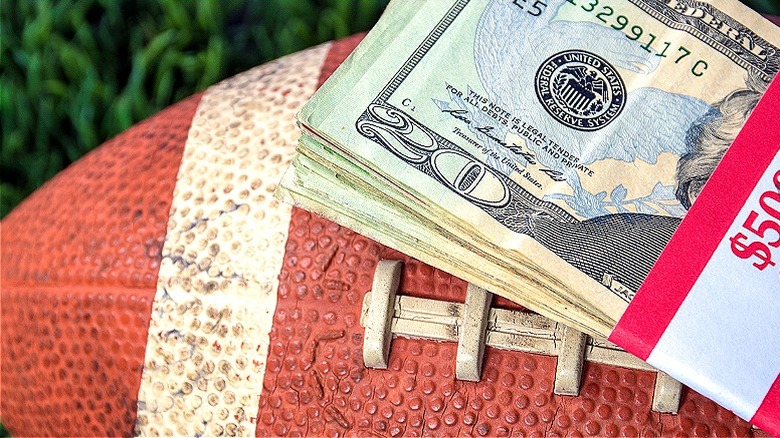What Does Even Money Mean In Sports Betting?
Sports betting is growing, and rapidly in the United States. Since the 2018 Supreme Court decision that overturned the Professional and Amateur Sports Protection Act (or PAPSA), effectively clearing the way for states to legalize gambling on sports, a whopping 38 states and the District of Columbia have legalized sports betting in some way. This has left many people with a LOT of questions about how exactly sports betting works as they join in on either in-person retail or online sports betting options.
It's not just a few people either. An early 2024 St. Bonaventure/Siena Research survey, for example, found that one in five Americans have an online sports betting account, while 39% reported having bet on sporting events. According to another survey by NerdWallet, people who gambled in the last 12 months reportedly wagered an average of $1,027 over that period, with men risking significantly more ($1,294) than women ($433). Even more interesting? The generation with the highest average wager amount was Generation Z, which reportedly wagered $1,885 on average.
As more and more people embrace sports betting, and wager record amounts for sporting events (like, say, the Super Bowl), it's become increasingly difficult to escape this new betting reality in the U.S. Whether you've seen the many prolific ads for companies like DraftKings or FanDuel, or have even had a friend talk your ear off about their bets, you probably have some questions about how the whole thing works. Getting started in sports betting requires a bit of basic knowledge, at least, so let's dive into some basics, starting with how even money works in sports betting.
Understanding even-money bets
For starters, American odds are listed with either a minus sign ("-") or a plus sign ("+") in front of the odds (that is, the price for a bet). These signs indicate if a bet is toward the favorites, indicated by a minus sign, or the underdogs, indicated by the plus sign. These two symbols give sports bettors a clear visual indication of what outcome the specific sportsbook predicts for a bet. This brings us to an even-money bet, which is typically represented as +100 in an online sportsbook. An even-money bet is when the odds rate a bettor receives is an even (1-to-1) payout of their initial principal. In other words, if you bet $20, then your winnings would be $20, plus you'd receive the original $20 of your principal (or bet amount) back.
It's also important to realize that even money bets are typically seen on something known as a moneyline bet. Moneyline bets typically have just two possible outcomes (usually which team will ultimately win) or a potential third option for sports that allow for ties. This makes moneyline bets a much simpler and straightforward form of sports betting than something like, say, understanding a parlay bet. In this way, even-money bets are bets in which a bookmaker has deemed a given outcome has a roughly 50% chance of occurring. So, while even-money bets might not offer the promise of high returns like more risky wager types would, the likelihood of winning an even-money bet is inherently better than it would be with those riskier bet types.
Things to look out for when betting
Even-money bets tend to offer a more balanced reward-versus-risk betting strategy (since you have an even chance of winning or losing). This can make this wager type an appealing betting option for anyone new to the world of sports betting (here, by the way, are common mistakes new users make on sports betting apps).
Further, betting even money can be a more comfortable option for those with a more conservative risk tolerance. This is mainly because even-money bets tend to be perceived as more fair than other wager types. However, while even-money betting can feel relatively straightforward, there are still some important considerations to take into account before placing your wager. For one, the specific sport you're betting on can dramatically change what kind of knowledge and research on players or teams might be required to make an informed even-money bet. For instance, even-money bets in the NFL could involve understanding specific defensive or offensive stats, whereas an NBA bet might be better served by having an understanding of team dynamics.
It's also important to keep your gambling and/or sports betting behavior within reasonable and manageable levels. According to the National Council on Problem Gambling, 2.5 million people across the United States are estimated to meet the criteria for severe gambling problems in a given year, while another 5 to 8 million are considered to have mild or moderate gambling problems. In fact, since the 2018 repeal of PAPSA, NCPG has reported a 30% increase in gambling problems. (Learn what you can do if you know someone with a gambling problem.)


